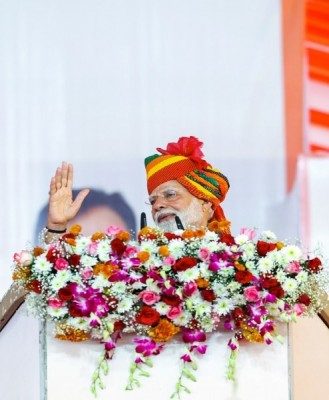
Press freedom in India has deteriorated in the past four months: The Hoot
New Delhi, May 2 (IBNS): Press freedom in India has deteriorated in the past four months and even the country witnessed the killing of three journalists during this period, as per media watchdog The Hoot.
"Media freedom continued to deteriorate in the first quarter of 2018 in India," The Hoot said in its report.
"The first quarter of 2018 has seen three killings and 13 attacks on journalists, defamation cases that came to trial, a sedition case against a journalist and a clear push by both state and central government and the judiciary, through regulatory policy as well as judicial orders, to curb free speech. There were also around 50 instances of censorship, and more than 20 instances of suspension of Internet services, as well as the take down of online content.," it said.
The Hoot in its reports said: "Journalists continued to be vulnerable."
The Hoot’s 2017 report had documented the murder of three journalists which could be clearly linked to their journalism. In the first four months of 2018 as well, three journalists were killed in connection with their reporting, judging by what initial investigations show.
" For 2017 we had documented 46 attacks on journalists and media workers. Between January and April 2018, there have been 13 already all across the country, three of them in West Bengal," said the report.
The The Hoot report came out just days after
India's ranking in the Press Freedom Index dropped two places to stand at 138.
The latest ranking was released last Wednesday.
The annual report was released by Reporters Without Borders (RSF).
The organization pointed that Gauri Lankesh death was one incident that hit Indian media situation hard.
In its statement about media situation in India, RSF said: " With Hindu nationalists trying to purge all manifestations of 'anti-national' thought from the national debate, self-censorship is growing in the mainstream media and journalists are increasingly the targets of online smear campaigns by the most radical nationalists, who vilify them and even threaten physical reprisals."
"At least three of the journalists murdered in 2017 were targeted in connection with their work. They included the newspaper editor Gauri Lankesh, who had been the target of a hate campaign on social networks," it said pointing at the Lankesh murder incident.
"Three other journalists were killed for their professional activity in March 2018. Prosecutions are also used to gag journalists who are overly critical of the government, with some prosecutors invoking Section 124a of the penal code, under which “sedition” is punishable by life imprisonment. No journalist has so far been convicted of sedition but the threat encourages self-censorship. Coverage of regions that the authorities regard as sensitive, such as Kashmir, continues to be very difficult," it said.
"When not detained, Kashmiri journalists working for local media outlets are often the targets of violence by soldiers acting with the central government’s tacit consent," read the note on India.
Support Our Journalism
We cannot do without you.. your contribution supports unbiased journalism
IBNS is not driven by any ism- not wokeism, not racism, not skewed secularism, not hyper right-wing or left liberal ideals, nor by any hardline religious beliefs or hyper nationalism. We want to serve you good old objective news, as they are. We do not judge or preach. We let people decide for themselves. We only try to present factual and well-sourced news.







